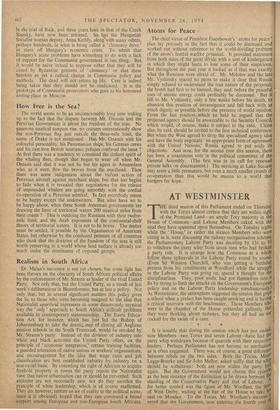Realism in South Africa
Dr. Malan's successor is not yet chosen, but some light has been thrown on the obscurity of South African political affairs by the endorsement of Mr. Strauss as leader of the rival United Party. Not only that, but the United Party, as a result of last week's deliberations in Bloemfontein, has at last a policy. Not only that, but in several significant matters this policy gives the lie to those who were becoming resigned to the idea that Nationalist apartheid represents in some disastrously mystical way the ` only ' approach to South Africa's difficult problems available to contemporary statesmanship. The Bantu Educa- tion Act, for instance, which has just led the Bishop of Johannesburg to take the drastic,.step of closing all Anglican mission schools in the South Transvaal, would he revoked by Mr. Strauss's party. Instead of the division of industry into white and black activities the United Party offers, on the principle of ` economic integration,' certain training facilities, a guarded toleration, of native unions or workers' organisations, and encouragement for the idea that wage rates and job classification are best established industry by industry on a non-racial basis. By conceding the right of Africans to acquire freehold property in towns the party rejects the Nationalist view that native urbanisation can or should be prevented. Such attitudes are not necessarily new, nor do they sacrifice the principle of white leadership, which is of course reaffirmed. They do, hoWever, restore an air of reality to the political scene, since it is obviously hoped that they can command a broad support among European and non-European South Africans.










































 Previous page
Previous page